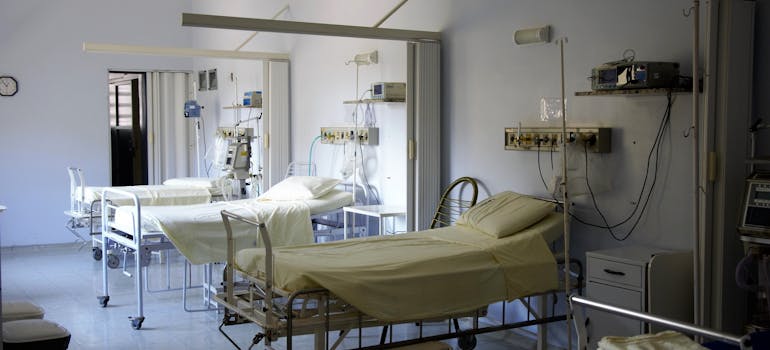Choosing the right path in addiction recovery can feel overwhelming. If you’ve heard the terms detox vs rehab, you might wonder what exactly sets them apart and which is right for you. Harmony Ridge Recovery Center offers both, but it’s important to know how they differ and how they work together. Detox is the first step, helping clear your body of toxins with medical oversight, setting the stage for the deeper, longer-term work of rehab. Rehab builds on this by tackling the psychological triggers of addiction, equipping you with strategies for sustained recovery. Understanding the roles of both detox and rehab can empower you to make informed decisions about your or your loved one’s recovery journey.
What is Detox?
Detox is the very first step if you’re starting a journey toward recovery from addiction. Think of it as a reset for your body. During detox, the main goal is to safely manage withdrawal symptoms when you start tackling your drug or alcohol addiction. It’s about giving your body time to rid itself of all the toxins accumulated from substance use.

This process is medically supervised to ensure safety, as withdrawal can often be physically uncomfortable and sometimes dangerous. Detox is critical because it provides a clean slate, but remember, it doesn’t address the underlying issues that led to addiction. It’s designed to prepare you physically for the next steps in your recovery journey.
What is Rehab?
After detox, rehab takes over to address the deeper causes of addiction. Rehab isn’t just one thing; it’s a comprehensive program that includes therapy, education, and support to help rebuild your life. Here, the focus shifts from the physical aspects of substance withdrawal to the psychological underpinnings. Rehab involves various forms of therapy, including group sessions, one-on-one counseling, and sometimes family therapy.

These interventions aim to uncover the root causes of your addiction, teach you valuable coping strategies, and help repair relationships damaged by substance use. Rehab programs can be residential or outpatient, but all share the goal of promoting long-term recovery and providing the tools needed for handling life’s challenges without resorting to substance use.
Physical vs. Psychological Recovery
Detox vs. Rehab—it’s essential to know the difference when navigating addiction recovery. Detox is your first step, focusing on clearing out toxins from your body. This stage is primarily about physical withdrawal, helping you stabilize medically as substances leave your system. It’s a crucial phase but it’s just the beginning.
Rehab picks up where detox leaves off, but it dives much deeper. It’s not just about removing substances; it’s about understanding and transforming your behavior. Rehab looks at what drove your addiction in the first place and teaches new ways to cope without drugs or alcohol. If you want to tackle the psychological roots of addiction with therapy and support, finding the right rehab for yourself is the best choice. Together, detox and rehab provide a comprehensive approach to recovery, addressing both the immediate physical challenges and the deeper emotional struggles.
How Long Does Detox and Rehab Take?
Detox, the first phase in overcoming drug addiction, is relatively quick. It usually lasts from a few days up to a couple of weeks. This period is focused on clearing drugs from your body and managing the acute symptoms of withdrawal safely under medical supervision. It’s a critical step, but it’s just the beginning.
In contrast, rehab takes a longer-term approach and can vary significantly in duration—lasting anywhere from several weeks to several months, depending on your specific needs. Rehab goes beyond the physical aspects of addiction. It involves intensive therapy to tackle the psychological factors that contribute to drug addiction, aiming to equip you with strategies and skills for lasting recovery. While detox helps you start clean, rehab prepares you to stay clean, offering deeper, sustained support.
Where Detox vs. Rehab Occur
Detox and rehab for drug addiction can take place in various settings, each designed to foster healing and recovery. Hospitals often provide detox services, especially for those experiencing severe withdrawal symptoms that require immediate medical attention. Specialized detox centers offer a more focused environment where medical staff help manage the detox process in a safe, controlled setting.

For a deeper level of care, residential treatment facilities in WV and elsewhere provide a comprehensive rehab experience. These facilities are ideal for intensive rehabilitation, offering a supportive community and a range of therapeutic activities. In these settings, you can fully immerse yourself in the recovery process, away from everyday stresses and triggers. This supportive environment helps you focus solely on your recovery, providing the tools and support needed to build a foundation for long-term sobriety.
Medical Supervision During Detox
Medical supervision during detox is crucial, especially if you’re withdrawing from alcohol or specific drugs known for severe withdrawal symptoms. In these situations, the risks can be high, with potential complications that could threaten your health. That’s why detox programs typically offer 24-hour medical care. This continuous monitoring ensures that any adverse symptoms can be quickly managed, significantly reducing health risks.
A key part of this process is medication assisted treatment West Virginia detox centers offer. MAT combines medications with counseling and behavioral therapies to provide a holistic approach to substance abuse treatment. This method not only eases withdrawal symptoms but also works to treat the underlying causes of addiction, providing a safer and more controlled path toward recovery. It’s about keeping you safe while laying a firm foundation for the next steps in your recovery journey.
Support Systems in Rehab
Rehab isn’t just about overcoming addiction on your own; it’s about building a supportive network around you with a variety of therapies. Each element of rehab is designed to provide comprehensive support, ensuring you have the tools and backing to make lasting changes. Here’s what you can expect:
- Individual counseling: Dive deep into personal challenges and develop strategies for overcoming addiction through one-on-one sessions with a therapist.
- Group therapy: Share experiences and learn from others facing similar struggles. It’s a space to gain insights and support from peers.
- Family therapy for addiction: Heal relationships and involve your loved ones in the recovery process. This helps everyone understand the dynamics of addiction and how to support each other.
- Holistic treatments: These might include activities like yoga, meditation, or art therapy, which help to balance your mental, physical, and emotional health.

Addressing Addiction Detox vs. Rehab Approaches
Detox is the first step in overcoming addiction, focusing on the physical aspects. This phase involves safely removing substances from your body under medical supervision. It’s crucial because it addresses the immediate physical effects of addiction, preparing your body to be free of drugs or alcohol.
However, detox is just the beginning of a much longer journey. Rehab for a loved one takes a deeper dive. It goes beyond the physical symptoms to tackle the root causes of addiction. Rehab centers on healing mentally and emotionally, developing critical coping skills, and laying the groundwork for long-term recovery. Here, you or your loved one will learn to understand triggers, improve response mechanisms, and build a supportive network, essential steps for sustaining recovery and preventing relapse.
What Treatment Techniques to Expect in Rehab
In rehab, using proven methods to tackle addiction is key. These therapies are not just about talking; they are about transforming your life. Each one offers unique tools that can help you develop resilience and a positive mindset, crucial for long-term recovery. Here are some of the top therapies that have helped many people reclaim their lives:
- Cognitive-behavioral therapy (CBT): This therapy helps you identify negative thought patterns and replace them with healthier ones, teaching you how to handle challenges without turning to substances.
- Dialectical behavior therapy (DBT): DBT is great for emotional regulation. It teaches you skills to manage stress, control your emotions, and improve relationships through mindfulness and emotional regulation.
- Motivational interviewing for substance abuse: This technique focuses on enhancing your motivation to change. It helps you resolve ambivalence towards recovery and commit to making positive changes.
Continuum of Care from Detox to Rehab
Detox is your starting line in the race against addiction. It’s crucial for clearing your body of substances and setting you up for the next stages of recovery. But the journey doesn’t end there. Transitioning smoothly from detox to a rehab program is essential to tackle the deeper issues of your addiction.

Rehab programs provide a continuum of care to support you every step of the way. Each phase is designed to build upon the last, ensuring you have ongoing support and the tools necessary to maintain your new sober lifestyle long-term. This includes:
- Residential services: Where you live at the facility and receive full-time support.
- Intensive outpatient program West Virginia: Offers flexibility to live at home while attending sessions several times a week.
- Aftercare services: Continues support even after you’ve completed the program, helping prevent relapse.
The Importance of Individualized Treatment Strategies
Every journey to recovery is unique, just like you. That’s why personalized treatment plans are crucial in both detox and rehab. When you first enter a program, healthcare professionals will conduct a thorough assessment. They’ll consider your specific needs, preferences, and the history of your addiction. This initial step is vital to tailor a treatment plan that fits you perfectly.
The process is collaborative—doctors, therapists, and you, as the client, all have a voice. This team approach ensures that your treatment plan not only targets your physical health but also addresses emotional and psychological needs. The goal is to craft a path that feels right for you, one that you can commit to confidently and that increases your chances of long-term success. This tailored care is a cornerstone of effective addiction treatment, guiding you towards a healthier, substance-free life.

Common Misunderstandings About Addiction Treatment
Myth: Detox alone is enough to beat addiction.
Truth: Detox is crucial as it clears your body of substances, but it’s just the starting line. Addiction involves complex behaviors and emotional triggers that detox alone can’t address. Rehab steps in to help you understand and manage these triggers, providing the tools for long-term recovery.
Myth: Home detox methods are just as effective as professional detox.
Truth: While some believe they can manage detox at home with natural remedies or cold turkey methods, this can be dangerous, even life-threatening. Professional detox provides medical supervision which ensures safety and eases withdrawal symptoms, which home methods can’t guarantee.
Myth: Rehab is only for the most severe addiction cases.
Truth: Rehab is not reserved for only ‘severe’ cases; it’s beneficial for anyone struggling with addiction. Whether it’s a new struggle or a long-term battle, rehab provides structured support and therapy to help overcome addiction at any stage.
Myth: Detox and rehab can cure addiction permanently.
Truth: Detox and rehab are vital steps in managing addiction, but addiction is often a chronic condition. Ongoing management, support groups, and sometimes continued therapy are essential to maintain sobriety.
Myth: If you relapse, detox and rehab didn’t work.
Truth: Recovery is a journey, and relapse can be a part of it for some. It doesn’t mean failure; rather, it’s a signal to reassess and modify your treatment plan. Many find that returning to rehab or adjusting their aftercare plan helps them regain control.
Detox and Rehab as Partners in Recovery
As you consider the road to recovery, remember the journey involves more than just overcoming physical dependence. Rehab provides a vital continuation of the process that begins with detox. At Harmony Ridge Recovery Center, we ensure that you don’t just detox but also learn how to rebuild your life and sustain that new life for the long term. If you’re thinking about starting this journey, think of detox vs rehab as necessary partners that together create a full spectrum of care. Knowing this can give you the confidence to take the first step toward recovery with clarity and support. Let’s embrace this path not just with hope but with a plan.



